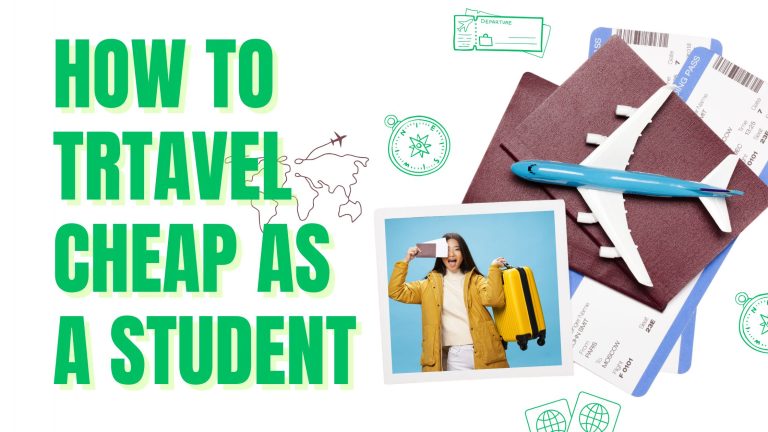Travelling as a student often feels like a distant dream, overshadowed by tight budgets and academic responsibilities. However, you can explore the world without breaking the bank with careful planning and wise decisions. In this comprehensive guide, we’ll share practical tips to Travel Cheap as a Student, ensuring you maximize your adventures while keeping your expenses in check.
1. Plan Your Trips During Off-Peak Seasons
One of the most effective ways to travel cheaply as a student is by avoiding peak travel seasons. Popular destinations often hike prices during holidays and tourist-heavy months. Instead, travel during the off-season when flights, accommodations, and attractions are significantly cheaper. For example, consider visiting Europe in late autumn or early spring rather than summer.
Benefits of Traveling During Off-peak Seasons
Travelling during off-peak seasons offers numerous benefits, making it an attractive option for budget-conscious travellers, adventurers, and those seeking a more relaxed experience. Here’s an analysis of the key advantages:
1. Cost Savings
- Cheaper Flights and Accommodation: Airlines and hotels often lower their prices during off-peak seasons to attract customers. This can significantly reduce travel expenses.
- Discounted Attractions and Activities: Many tourist attractions and activities offer discounts during these periods to encourage visitors.
2. Less Crowded Destinations
- Improved Experiences: Popular destinations are less crowded, allowing for a more authentic and enjoyable experience. You can explore landmarks, museums, and natural attractions without long waits or overcrowding.
- Better Interaction with Locals: Smaller crowds provide more opportunities to engage with locals, enhancing cultural experiences and gaining insights into the destination.
3. Pleasant Weather
- Milder Climate: Off-peak seasons often coincide with milder weather conditions in many destinations, such as spring or fall, making outdoor activities more comfortable.
- Unique Seasonal Charm: Depending on the location, off-peak travel can showcase unique seasonal landscapes, such as autumn foliage or winter tranquillity.
4. Flexible Travel Options
- Easier Bookings: With fewer travellers, it’s easier to secure flights, accommodations, and restaurant reservations at your preferred times and locations.
- Last-Minute Deals: Off-peak seasons often present opportunities for last-minute deals and spontaneous travel plans.
5. Enhanced Relaxation
- Quieter Atmosphere: The reduced hustle and bustle during off-peak times promotes a more serene and relaxing vacation.
- Personalized Service: Fewer tourists mean more attentive service from hotels, tour operators, and other service providers.
6. Eco-Friendly Benefits
- Reduced Environmental Impact: Traveling during less busy times helps distribute the environmental burden of tourism, minimizing overcrowding and wear on popular sites.
- Support for Local Economies: Off-peak travel supports local businesses during slower periods, helping them maintain steady revenue.
7. Unique Cultural Events
- Local Festivals and Traditions: Off-peak seasons often align with unique local festivals and traditions that aren’t overrun by tourists, offering an authentic cultural experience.
8. Potential Considerations:
- Limited Availability: Some attractions or activities may be closed or operate on reduced schedules.
- Weather Risks: Certain destinations may experience less favourable weather during off-peak times (e.g., monsoon or hurricane seasons).
Travelling during off-peak seasons is an excellent choice for those seeking affordability, tranquillity, and authentic experiences. While there may be some trade-offs, the benefits often outweigh the drawbacks, particularly for travellers who value flexibility, cost savings, and a more personal connection to their destination.
2. Leverage Student Discounts
Many airlines, trains, museums, and attractions offer discounted rates for students. A study by ISIC revealed that students could save an average of 20-30% on travel expenses by utilizing student discounts. Always carry your student ID card or International Student Identity Card (ISIC) to access these benefits. Platforms like UNiDAYS and StudentUniverse specialize in providing deals tailored to students, making travelling cheap as a student easier.
3. Book Flights Early and Use Fare Comparison Tools
Airfare can consume a significant portion of your travel budget. To reduce costs:
- Book your tickets well in advance to secure lower rates. Data from CheapAir.com shows that the best time to book domestic flights is between 1 to 3 months before departure, while international flights should be booked 2 to 8 months in advance.
- Use fare comparison websites like Skyscanner, Google Flights, or Hopper to find the cheapest flights.
- Be flexible with your travel dates and consider flying mid-week, as flights are often cheaper on Tuesdays and Wednesdays.
- Look into budget airlines, but consider additional baggage and seat selection fees.
4. Travel Light to Save on Baggage Fees
Packing light is not only convenient but also cost-effective. According to a 2022 survey by NerdWallet, travellers spend an average of $50 to $100 on baggage fees per trip. Many budget airlines charge high fees for checked luggage. Stick to a carry-on bag and pack only the essentials. Use packing cubes to maximize space and stay organized. Minimalist packing is a key strategy for travelling cheaply as a student.
5. Choose Affordable Accommodations
Accommodation is another significant expense, but there are plenty of budget-friendly options:
- Hostels: Stay in dormitories or shared rooms to save money and meet fellow travellers. Hostelworld reports that the average nightly cost of a hostel is $20 to $40 in most destinations.
- University Housing: Some universities rent out dorm rooms during holidays at affordable rates.
- Homestays and Couchsurfing: These options provide free or low-cost lodging while allowing you to experience local culture.
- Airbnb: Opt for shared spaces or budget-friendly private rooms.
6. Cook Your Meals
Eating out every day can quickly drain your funds. According to Numbeo, the average meal cost at a European mid-range restaurant is around $15. If your accommodation has a kitchen, take advantage of it by cooking your meals. Shop at local grocery stores or markets to experience regional cuisine without overspending. When dining out, look for student discounts or visit restaurants offering lunch specials.
7. Use Public Transportation
Instead of relying on taxis or rental cars, use public Transportation to explore your destination. A 2023 study by Statista found that public transit costs 70% less than car rentals on average. Many cities offer discounted travel cards for students, allowing unlimited rides on buses, trains, and subways. Walking or cycling is another excellent way to save money while soaking in the local atmosphere.
Benefits of Using Public Transportation for students traveling on a budget
Public transportation offers several benefits for students travelling on a budget. Here are some of the key advantages:
Cost-Effectiveness
- Cheaper Fares: Public Transportation is significantly more affordable than taxis, rental cars, or rideshares.
- Student Discounts: Many cities offer discounted fares for students, making it even more affordable.
Accessibility
- Wide Coverage: Public transit systems often cover key destinations, including tourist attractions, universities, and city centres.
- Frequent Stops: Easy access to buses, trains, or subways eliminates the need for additional transport.
Authentic Experience
- Local Culture: Riding public Transportation allows students to experience the daily life and culture of the local population.
- Language Practice: It’s an excellent opportunity to practice communication skills in a foreign language if travelling internationally.
Environmental Benefits
- Eco-Friendly Travel: Public transit reduces the carbon footprint compared to individual car rides, aligning with sustainability values.
- 5. Convenience
- No Parking Hassles: Public transit eliminates the need for parking, which can be expensive and time-consuming in busy areas.
- Reliable Schedules: Most systems operate on a regular schedule, making it easier to plan your day.
Increased Independence
- Confidence Building: Navigating a public transit system helps students build confidence in unfamiliar environments.
- Enhanced Navigation Skills: It improves map-reading and time-management abilities.
Opportunities for Spontaneity
- Discover Hidden Gems: Traveling like a local might lead students to discover off-the-beaten-path locations not typically visited by tourists.
- Flexibility: With frequent service, students can easily explore new areas without being tied to fixed tour schedules.
Budget for Other Experiences
- More Money for Activities: Savings from using public Transportation can be allocated to other travel experiences, such as visiting attractions, dining out, or shopping.
- Public Transportation is a practical and enriching choice for students looking to travel affordably while gaining valuable life experiences.
Take Advantage of Free Activities and Attractions
- Many destinations have free or low-cost attractions that offer enriching experiences:
- Visit public parks, beaches, and hiking trails.
- Explore museums and galleries on free-entry days. For instance, the Louvre in Paris offers free entry to visitors under 26 from the EU.
- Attend local festivals or community events.
- Take self-guided walking tours to discover hidden gems.
By prioritizing free activities, you can travel cheaply as a student while having a memorable trip.
9. Travel in Groups to Split Costs
Travelling with friends can significantly reduce costs. A 2022 survey by TripAdvisor revealed that group travellers save an average of 20% on accommodations and Transportation by splitting expenses. Group discounts on attractions and activities are another bonus of travelling with companions.
10. Earn While Traveling
If your schedule allows, consider working part-time or freelancing during your travels. Teaching English, offering tour services, or doing freelance gigs online are great ways to earn extra money. Websites like Workaway and WWOOF connect travellers with opportunities to work in exchange for free accommodation and meals.
11. Stay Connected Without Overspending
Use free Wi-Fi at cafes, libraries, and hostels to avoid expensive roaming charges. For staying connected on the go, consider purchasing a local SIM card with a data plan. According to a 2023 GSMA report, local SIM cards save travellers an average of $40 per trip compared to international roaming services.
12. Use Travel Rewards and Loyalty Programs
Sign up for student-friendly credit cards that offer travel rewards or cashback. Accumulate points on flights, accommodations, and purchases to redeem for discounts or free travel in the future. Additionally, join loyalty programs offered by airlines and hotel chains to unlock exclusive perks. According to Forbes, using travel rewards effectively can save travellers up to 15% on total trip costs.
13. Be Flexible With Your Destination
Instead of choosing a destination and then searching for deals, flip the process. Use tools like Google Flights’ “Explore” feature to find budget-friendly destinations from your location. Being open to new places often leads to discovering hidden gems while keeping costs low.
14. Limit Souvenir Spending
While buying souvenirs is tempting, focus on meaningful and affordable items. Alternatively, capture memories through free photos and videos, which last a lifetime. This small change can make a big difference in your goal to travel cheaply as a student.
15. Use Overnight Transportation
Travelling overnight via buses or trains can save money on accommodations. Overnight journeys serve a dual purpose: getting you to your destination and providing a place to sleep. For instance, Eurail night trains in Europe offer affordable sleeper options.
16. Avoid Tourist Traps
Popular tourist areas often have inflated prices. A study by TripSavvy revealed that prices in tourist hotspots are 25% higher than in local neighbourhoods. Explore less crowded neighbourhoods and dine at local eateries to enjoy authentic experiences at a fraction of the cost. Researching beforehand can help you identify overpriced attractions and alternatives.
How can you avoid tourist traps while sticking to a student budget?
Avoiding tourist traps can help you have a more authentic and enjoyable travel experience. Here are some tips to steer clear of them:
- Research Before You Go: Read up on the destination and look for recommendations from reliable sources like travel blogs or forums. Websites like TripAdvisor and Google Reviews can help you spot overhyped attractions.
- Ask Locals for Recommendations: Locals often know the hidden gems tourists miss. Ask them where they like to go or eat if you’re unsure.
- Avoid Popular Tourist Spots During Peak Hours: During peak times, tourist spots are overcrowded and overpriced. Visit early in the morning or late in the afternoon to avoid the crowds.
- Look for Authentic Dining Experiences: Instead of eating at restaurants near popular tourist spots, venture into local neighbourhoods. You’ll find more authentic food at lower prices.
- Check Prices Before Buying: Tourist areas often mark up prices. Always check prices before buying souvenirs or services. If something feels overpriced, it’s a tourist trap.
- Stay Away from Overly Commercialized Areas: If a place feels explicitly designed for tourists, with many gift shops and tour buses, it’s likely a tourist trap. Explore areas off the beaten path for more authentic experiences.
- Use Public Transport: Tourist shuttle buses or private taxis are often expensive and can take you to overpriced attractions. Using local public transport can save money and give you a more local experience.
- Look for Free or Low-Cost Attractions: Many destinations have great, free, or inexpensive attractions that aren’t crowded with tourists. Research parks, museums with free entry days, or community events.
- Book Tours with Caution: If you decide to book a tour, look for reviews and ensure the tour is offered by a reputable local company, not a big tourist agency.
- Trust Your Instincts: If something seems too good to be true or feels overly commercial, trust your gut and move on. There are always better, more authentic alternatives.
By planning and staying aware, you can avoid the typical tourist traps and enjoy a more immersive and rewarding experience.
17. Stay Updated on Deals and Offers
Sign up for newsletters and follow travel deal websites like Travelzoo, Secret Flying, and The Points Guy. These platforms regularly share deals and tips tailored to budget-conscious travellers.
18. Keep an Emergency Fund
While the goal is to travel cheap as a student, always have a small emergency fund for unexpected expenses. A 2023 survey by Allianz Travel Insurance found that 30% of travellers encounter unexpected costs during trips. Having a backup fund ensures you’re prepared without compromising your journey.
19. Embrace Slow Travel
Rushing through multiple destinations can be expensive and exhausting. Instead, spend more time in one place to reduce transportation costs and immerse yourself in the local culture. According to Lonely Planet, slow travellers save an average of 25% on transportation costs compared to those with jam-packed itineraries.
20. Plan Your Itinerary Wisely
Planning your itinerary can be the difference between a seamless and chaotic trip. Data shows that travellers who pre-book activities and transport save up to 30% compared to those who arrange last-minute plans. Start by listing must-see attractions, then organize your schedule to minimize unnecessary travel back and forth. For instance, clustering activities by neighbourhood can reduce transport costs. Additionally, leave room for downtime to avoid burnout and impulse spending on overpriced conveniences like taxis or quick meals. Tools like Google Maps and TripIt can help you design an efficient itinerary.
Travelling on a student budget doesn’t have to mean compromising on experiences. By planning, leveraging discounts, and making wise choices, you can enjoy incredible adventures without overspending. Remember, the goal is to prioritize experiences over extravagance and focus on creating memories that last a lifetime.
Start implementing these tips today and discover how easy it is to travel cheaply as a student. Happy travels!





